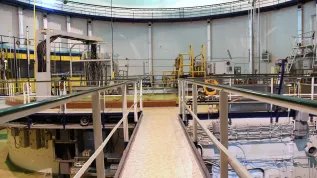Wrocław/ Scientists have developed labels for food products that respond to changes in temperature or humidity

13.06.2025 updated: 13.06.2025
2 minutes of reading
Labels that respond to changes in temperature or humidity, which can be placed on food products, medicines and electronics, have been developed by scientists from the Łukasiewicz – PORT Institute in Wrocław (Polish Centre for Technology Development).
Sensory labels developed by scientists from Wrocław may take the form of stickers that will be placed on food products, medicines or electronics sensitive to changes in humidity.
"We cover sensory labels, for example, with thermochromic dyes that change color under the influence of temperature. When a consumer sees a specific color on the label, they receive information about whether the product is stored at the correct temperature or not," Dr. Bartłomiej Potaniec, head of the research team at the Łukasiewicz-PORT Institute in Wrocław, which developed the sensory labels, told PAP.
The use of other dyes applied to labels allows you to check whether the product was transported or is stored in the right humidity, which is important in the case of electronics. Here, too, information for the consumer is conveyed through colors.
Dr. Potaniec pointed out that today, 10 to 20 percent of food ends up in the trash because it has exceeded its expiration date. "Our labels will help reduce these losses because they will provide information about storage conditions - temperature, humidity and time. Thanks to this, the consumer will easily assess whether the product is suitable for consumption," said the scientist.
Sensory labels can be particularly attractive to the pharmaceutical industry, where the conditions in which drugs are stored are very important.
Scientists at Łukasiewicz – PORT are currently working on expanding the temperature range that can be monitored using labels. “We have reached a level of around plus 50 degrees Celsius and minus 30 degrees Celsius. The challenge, however, is to reach minus 80 degrees Celsius, because this is the temperature at which tissues, reagents and enzymes that are particularly sensitive to temperature, transported on dry ice, are stored,” the scientist pointed out.
He added that by expanding the ranges in which sensory labels will be able to take measurements, it will be possible to quickly check whether samples of biological material reaching, among others, from hospitals to laboratories were transported in the required conditions and whether they were not damaged during transport. (PAP)
Science in Poland
pdo/ bar/
The PAP Foundation permits free reprinting of articles from the Nauka w Polsce Service, provided that you inform us by e-mail once a month about the use of the service and provide the source of the article. In portals and internet services, please include the linked address: Source: naukawpolsce.pl, and in journals the annotation: Source: Nauka w Polsce Service - naukawpolsce.pl. The above permission does not apply to: information from the "World" category and any photographs and video materials.
Before adding a comment, please read the Forum Rules of Nauka w Polsce.
Dear Reader, In accordance with the Regulation of the European Parliament and of the Council (EU) of 27 April 2016 on the protection of natural persons with regard to the processing of personal data and on the free movement of such data, and repealing Directive 95/46/EC (General Data Protection Regulation), we inform you about the processing of your data. The data administrator is the PAP Foundation, with its registered office in Warsaw at ul. Bracka 6/8, 00-502 Warsaw. This concerns data that is collected as part of your use of our services, including websites, services and other functionalities provided by the PAP Foundation, mainly saved in cookies and other online identifiers that are installed on our websites by us and our trusted partners of the PAP Foundation. The collected data is used only for the purposes of: • provision of services electronically • detecting abuses in services
• statistical measurements and service improvement
The legal basis for data processing is the provision of the service and its improvement, as well as ensuring security, which constitutes the legitimate interest of the administrator. Data may be made available at the request of the data administrator to entities authorized to obtain data under applicable law. The data subject has the right to access the data, rectify and delete the data, limit their processing. The person may also withdraw consent to the processing of personal data.
Please send any notifications regarding the protection of personal data to [email protected] or in writing to Fundacja PAP, ul. Bracka 6/8, 00-502 Warsaw with the note "personal data protection"
More information about the principles of personal data processing and the User's rights can be found in the Privacy Policy. Find out more. I agree
naukawpolsce.pl







